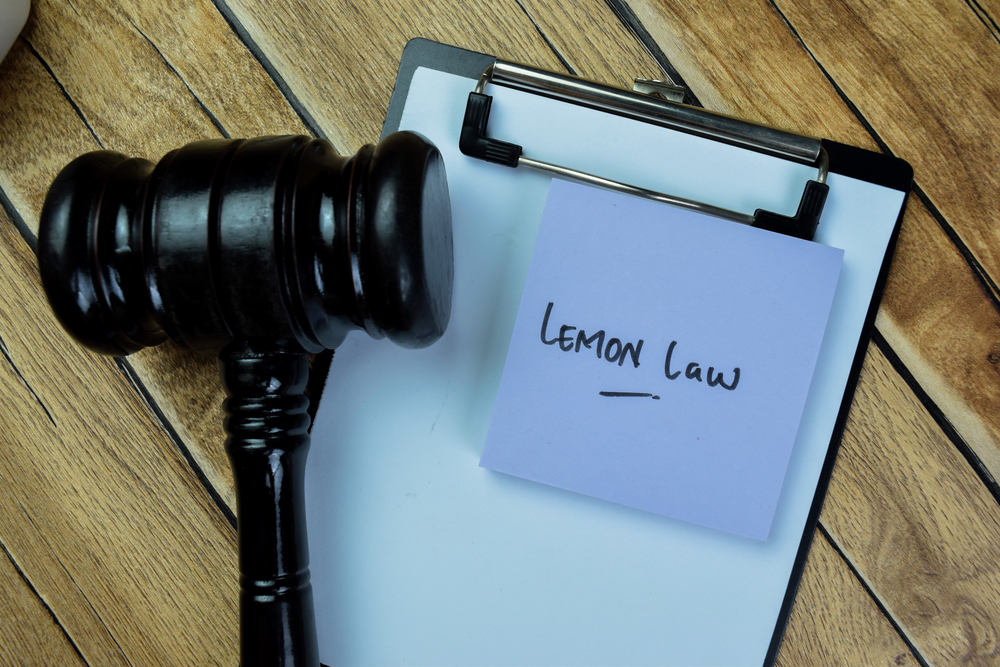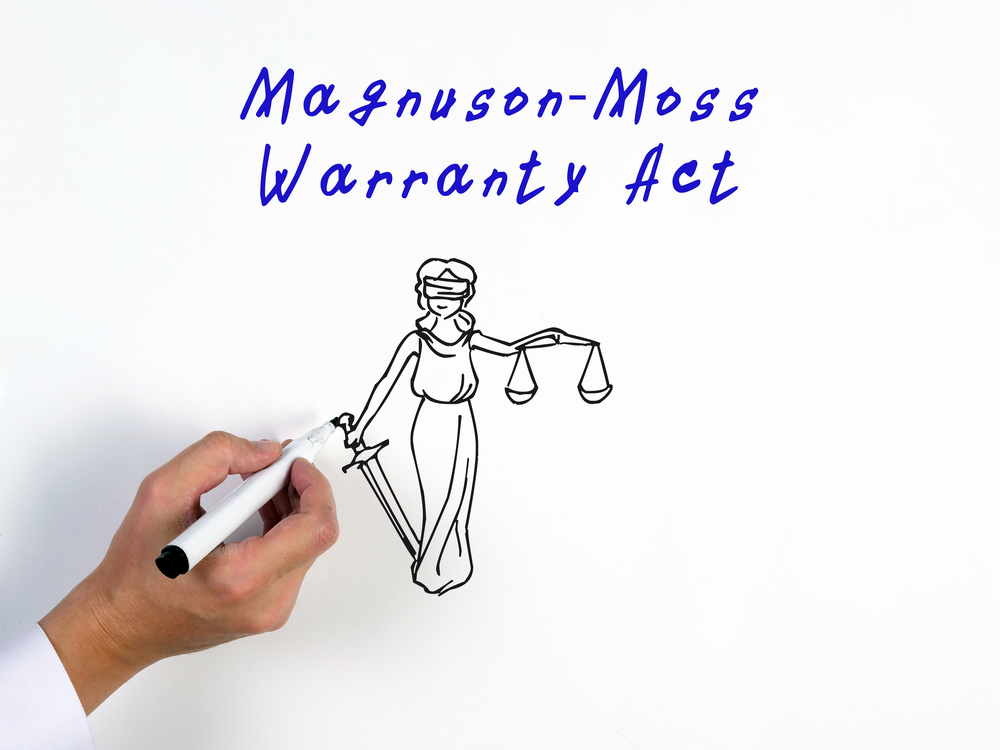Understanding consumer rights is not always straightforward. One area that often confuses and frustrates consumers is the Florida Lemon Law. Specifically designed to protect those who purchase or lease new motor vehicles, the Florida Lemon Law is a powerful tool in ensuring that consumers receive a vehicle that meets expected quality and safety standards.
What Is the Florida Lemon Law?

Concept of Lemon Law write on sticky notes with gavel isolated on Wooden Table.
The Florida Lemon Law aims to safeguard consumers who encounter persistent defects in their new vehicles by requiring manufacturers to replace, repair, or reimburse for faulty vehicles. The issues with the vehicle should be ones that substantially impair the vehicle’s use, value, or safety.
What Is Covered by Florida’s Lemon Law?

The Florida Lemon Law applies when your vehicle exhibits one or more nonconformities that have not been fixed after a reasonable number of attempts. A “reasonable number” is defined by law as three failed repair attempts for the same problem by an authorized service agent, or the vehicle being out of service for 15 or more cumulative total days due to repair services. Additionally, the defect must be one that substantially impairs the vehicle’s use, value, or safety.
However, there are conditions to these protections. The Lemon Law rights period, the period during which these protections apply, typically extends 24 months after the delivery of the vehicle. Furthermore, before you can file a Lemon Law claim, the law requires you to notify the manufacturer or its authorized service agent in writing via registered or express mail, allowing them a final opportunity to repair the vehicle.
What Defects Are Covered Under the Lemon Law?

Portrait of a mechanic at work in his garage
While the Florida Lemon Law covers a wide range of defects, it doesn’t cover every issue your vehicle might have. Defects or conditions that result from an accident, neglect, modification or alteration, or abuse aren’t covered by the Lemon Law in Florida. Instead, the law covers defects that originate from the manufacturer, specifically those that affect the operational or safety aspects of the vehicle.
These defects may include, but aren’t limited to, faulty brakes, steering problems, engine issues, and transmission failures, all of which can substantially impair the vehicle’s use, value, or safety. It’s crucial to maintain your vehicle according to the routine maintenance prescribed in the owner’s manual to ensure that any potential defect falls under the Lemon Law’s jurisdiction and can’t be blamed on you.
The law requires the defect to be reported to the manufacturer or its authorized service agent within the Lemon Law rights period to qualify for relief. If the same nonconformity continues to occur after a reasonable number of attempts at repair, the vehicle might be considered a defective vehicle under the Florida Lemon Law, thereby entitling the consumer to certain remedies.
Remedies Under Florida Lemon Law
When a vehicle qualifies as a “lemon” under the Florida Lemon Law, the manufacturer is legally obliged to either provide a replacement vehicle of comparable value or refund the full purchase price of the vehicle, less a reasonable amount for use. This refund should also include finance charges and incidental charges related to the vehicle’s purchase, repair, or replacement.
If the manufacturer fails to comply with these requirements, the consumer may file a claim with the Florida New Motor Vehicle Arbitration Board to seek redress. The board, governed by the Florida Attorney General’s Office, will then determine whether the vehicle indeed qualifies as a lemon and what compensation the consumer should receive.
Details of the State Lemon Law Process
When a new vehicle, whether bought or leased, consistently fails to meet quality and performance standards, the manufacturer or its authorized service agent must be given a reasonable number of attempts to fix the problem. In Florida, a reasonable number is typically considered to be three attempts for the same issue or if the vehicle has been out of service for 15 or more days within the Lemon Law rights period.
If the defect persists after these attempts, you must give the manufacturer a final opportunity to repair the vehicle. This should be done by sending a written notification, via registered or express mail, to the manufacturer, informing them that this is the final attempt they have. Once notified, the manufacturer has ten days to direct the consumer to a reasonably accessible repair facility. Once the vehicle reaches the facility, the manufacturer has another ten days to fix the defect.
If the defect is still present after this final attempt, the consumer is eligible to request a replacement vehicle or a refund. It’s important to note that this does not guarantee a replacement or refund. The manufacturer can dispute the claim, and if no resolution can be achieved, the case can be taken to the Motor Vehicle Arbitration Board. The board will review the facts and make a binding decision.
Do I Need an Attorney?

Business – meeting in an office, lawyers or attorneys discussing a document or contract agreement
While it’s not mandatory to have an attorney when filing a Lemon Law claim in Florida, the chances of getting a good outcome, and more quickly, go up exponentially when you do.
Navigating the legal process can be challenging and intimidating for those without legal training, and having a knowledgeable professional to guide you through the process can ensure you don’t miss any crucial steps or deadlines.
Additionally, an attorney can help you gather the necessary documentation, such as repair invoices, written correspondence with the manufacturer, and any other evidence that supports your claim. Furthermore, if your case goes to the Motor Vehicle Arbitration Board, an attorney can help you present your case effectively. An attorney also has the experience needed to negotiate with car manufacturers on your behalf.
Five Reasons a Lawyer Is Key for Accessing Your Rights Under the Lemon Law in Florida

Justice scale on wooden table with judge and client shaking hands in background at courtroom
Navigating the Legal Process
As previously mentioned, the legal process can be complex. An attorney can help guide you through it and ensure you meet all requirements and deadlines, so you don’t lose out just because you forgot a deadline or didn’t have the right piece of paper.
Gathering Evidence
An attorney can assist you in collecting all necessary documentation and evidence to support your claim, ensuring you have the strongest case possible and that you’re not missing a key piece of evidence that is critical to your claim.
Representation Before the Motor Vehicle Arbitration Board
If your case goes to the Motor Vehicle Arbitration Board, having an attorney represent you can help ensure your case is presented effectively and professionally, presenting the facts in a way the board is likely to accept.
Advocating for Your Rights
An attorney can advocate for the rights you’re entitled to under the Florida Lemon Law. Your attorney will also be able to tell you what your rights are.
You can be sure the manufacturer isn’t interested in making sure you’re aware of your rights! And while the state has laws that protect you, it’s not the state’s job to teach those laws or help individuals understand all their rights. That’s where an attorney becomes invaluable.
How Does the Magnuson-Moss Warranty Act Protect Consumers?

Business concept about Magnuson-Moss Warranty Act with sign on the piece of paper.
The Magnuson-Moss Warranty Act is a federal law enacted to protect consumers from deceptive warranty practices. This law applies to both new and used products, including motor vehicles, and complements the Florida Lemon Law.
While the Florida Lemon Law primarily covers new motor vehicles, the Magnuson-Moss Warranty Act broadens this protection to include used vehicles that come with a written warranty. The act states that if a product fails to live up to its written warranty, and the manufacturer or its authorized service agent is unable to repair it after a reasonable number of attempts, the consumer is entitled to a replacement or a refund.
It’s important to remember that, unlike the Florida Lemon Law, the Magnuson-Moss Warranty Act doesn’t define what constitutes a reasonable number of repair attempts. Instead, this is determined on a case-by-case basis, taking into account the nature of the defect and other relevant circumstances. Additionally, this act covers a broader range of issues not limited to those that substantially impair the use, value, or safety of the vehicle.
Do Lemon Laws Only Apply to New Cars?

Blue SUV car with sport and modern design parked on concrete road by the sea at sunset in the evening. Hybrid and electric car technology concept. Automotive industry. Headlamp
and fog lamp light.
The Lemon Laws apply to “motor vehicles” under the relevant Florida statute. A “motor vehicle” under this statute refers to a new, power-driven vehicle, sold in Florida, designed to carry people or goods. This definition includes recreational vehicles and demonstrator or leased vehicles, but only if a manufacturer’s warranty was provided at the point of sale or (in the case of a leased vehicle) if the lessee is responsible for repair costs. However, it does not include vehicles that only run on tracks, off-road vehicles, heavy trucks over 10,000 pounds, motorcycles, mopeds, or electric bicycles.
The definition of a motor vehicle also does not cover the living facilities within recreational vehicles. The living facilities of a recreational vehicle are the areas primarily designed and used for habitation. This includes elements such as the flooring, plumbing systems, roof air conditioner, furnace, generator, and non-automotive electrical systems. It also covers the side entrance door, exterior compartments, and windows, except for the windshield and the driver and front passenger windows.
Details on the Remedies Available Under Lemon Laws
When it’s determined that a motor vehicle is a “lemon” under the Florida Lemon Law, the consumer is entitled to either a replacement vehicle or a refund from the manufacturer. The replacement vehicle should be a new vehicle that is identical or reasonably equivalent to the vehicle it’s replacing.
If the consumer chooses a refund, they will receive the full purchase price of the vehicle. This includes all charges for taxes, title and registration, and any additional options or accessories installed by the manufacturer or its authorized service agent. The manufacturer may deduct a reasonable amount for the consumer’s use of the vehicle, however.
Filing a Lemon Law Claim
Filing a Lemon Law claim in Florida involves several crucial steps. After the manufacturer or its authorized service agent has made a reasonable number of attempts to repair the vehicle, and the defect persists, you must send written notification to the manufacturer. This gives them one final opportunity to repair the vehicle. At this stage, it’s important to have a lawyer to ensure the notification is done exactly according to the law.
If the manufacturer denies this request, ignores it, or fails to provide a satisfactory resolution, you can file a claim with the Florida New Motor Vehicle Arbitration Board.
What Are the Time Limits for Lemon Law Relief?

Wake up vintage morning shaped lemon. Concept illustrating that it is time to take vitamins. 3D rendering.
From the date of original delivery of the vehicle, the Lemon Law rights period extends for 24 months. Within this time, if your vehicle exhibits one or more nonconformities that substantially impair its use, value or safety, you are eligible to seek relief under the Florida Lemon Law.
Bear in mind that you must file your claim with the Board within 60 days after the expiration of the Lemon Law rights period or 30 days after the final decision from the manufacturer’s procedure, if one exists and you’ve used it.
You can make a lemon laws claim if your vehicle was out of commission for 30 days or more (or 60 days or more in the case of a recreational vehicle), but the usual period can be extended due to events beyond the consumer’s control, like war, invasion, strike, fire, flood, or natural disasters that make it impossible for you to get repairs done.
What Defenses Might the Manufacturer Raise?
Manufacturers usually try one of these defenses, which your lawyer will be prepared to help you fight:
- The claimed defect doesn’t actually affect the motor vehicle’s use, value, or safety.
- The defect is due to an accident, misuse, neglect, or unauthorized changes to the motor vehicle.
- The consumer’s claim was not made in good faith.
How Does Lemon Law Relief Work?
Lemon Law relief in Florida takes two forms: a replacement vehicle or a refund. If you opt for a replacement vehicle, the manufacturer must provide a new vehicle that is identical or reasonably equivalent to the defective vehicle.
In case of a refund, you’re entitled to the full purchase price of the vehicle. The purchase price includes not only the price you paid for the vehicle but also any charges for transportation, dealer-installed options, and substantial accessories installed by the dealer.
The refund will also cover incidental charges directly caused by the nonconformity or nonconformities that resulted in your Lemon Law claim. These can include things like towing charges or rental vehicle fees. However, the law requires a reasonable offset for your use of the vehicle.
While lemon laws provide a clear pathway for consumers to obtain relief when they’ve purchased a defective vehicle, it’s always wise to seek legal advice. Don’t hesitate to contact Jonathan D. Schwartz right away to protect your rights under this Florida state statute.

